EDITOR’S NOTE: Andrew Jenck has been the Pioneer’s movie reviewer for nearly five years, and we have literally watched him “grow up.” Andrew has also written a variet of editorials and feature stories for the Pioneer as well. This series is personal – his story about being autistic (Asperger’s) and how he continues to navigate life.
See below for links to the previous stories. Sammy’s Place/Oreogn COAAST Network (Communities of All Abilities Succeeding Together) has sponsored sharing Andrew’s story to provide a view from here to help others connect to resources and a supportive community.
By Andrew Jenck
Transitioning from high school to college was smoother than expected, having managed athletics, academics, volunteering (i.e., Key Club), and some community college courses. The most crucial factor, however, was having prior independence. Whereas many parents underestimate their children’s ability to function, mine allowed me to manage my own schedule, and deciding my own electives and social events. Such freedoms proved I could live without independently at the dormitories on campus. My choice was the University of Portland, given its familiar location, cross-country program, and impressive business academia; accounting being my major. Freshman Orientation introduced the campus resources (library, tutors, and student-athlete facilities) and the offerings of the city (restaurants, recreational centers, etc.) helped by supportive upperclassman. It was well-organized, but the potential challenges for neurodiverse individuals were largely absent. I would instead have to prepare for them myself, having to adapt myself constantly, grinding even, as new traits about myself were discovered, and learning such proved to be just as valuable as any collegiate course.
Sitting through lectures felt like an endurance test, not because of boredom but due to note taking. I wanted to write down every slide and professors’ remarks with such a quantity-focused approach proving inept. No matter the course, I always produced an underwhelming score on the first exam. Professors recognized my efforts, but subjects with heavier emphasis on critical thinking, particularly philosophy, required more engagement. Reviewing material with professors during their office hours would refine my understanding of the material and was mutually beneficial. I better understood the instructors’ approach and they learned how to communicate with me. A major benefit of UP was the student body size. Classes had fewer students than what you would find at OSU or UO, on average 30 to 40 kids. Professors were more accessible, meeting them one-on-one was monumental support, helping boost my grades from C’s and D’s to A’s and B’s.
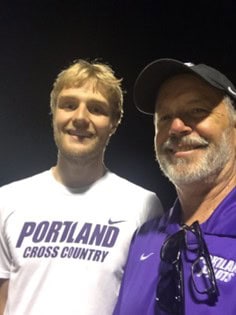
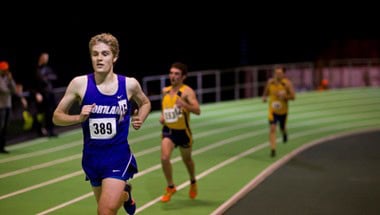 Running carried over to college, though slightly altered. The Portland Pilots have fostered dozens of professional runners, so I swam as big fish from a small Tillamook pond only to become a small fish in a large Portland lake. Reflections on this era are mixed. Had I managed academics better, I could’ve converted further energy into athletics and committed greater time to cross training, such as weightlifting. However, I proved to be crucial to the team as emotional support. One of the benefits of autism is that negative social norms may not be applicable to me. Hence, I could be one of the more flexible, uplifting teammates. Practice gave me levity from school: a chance to be around friends and release stress through workouts. Coach Rob Conner helped ground me in the team, providing instructions I could understand and being direct on how to improve my speed.
Running carried over to college, though slightly altered. The Portland Pilots have fostered dozens of professional runners, so I swam as big fish from a small Tillamook pond only to become a small fish in a large Portland lake. Reflections on this era are mixed. Had I managed academics better, I could’ve converted further energy into athletics and committed greater time to cross training, such as weightlifting. However, I proved to be crucial to the team as emotional support. One of the benefits of autism is that negative social norms may not be applicable to me. Hence, I could be one of the more flexible, uplifting teammates. Practice gave me levity from school: a chance to be around friends and release stress through workouts. Coach Rob Conner helped ground me in the team, providing instructions I could understand and being direct on how to improve my speed.
Track, academic group projects, and the dormitory were social opportunities where I could grow. The spirit of running provided a base for new connections, Team projects were another bottleneck to overcome. Feedback from my first group, highlighted my work ethic but criticized my narrowmindedness and lack of socialization. I then realized these projects were opportunities to bond with classmates, as small talk encouraged team chemistry and improved collaboration. In following groups, I was less reserved and more approachable, leading to new friendships, as we supported each other through study groups and sharing advice to tread through finals exams. Villa Maria Hall was the most active of the dorms at UP, housing the soccer teams’ cheer squad, hosting weekly competitions of Animal House-level buffoonery, and annual charity events. Simply being present in these events helped build a sense of community with these residents, conversing with them in the hallways, and becoming more comfortable in my speech and mannerisms. In turn, they also appreciated my authenticity, never putting on a persona, showing who I was — my atypical traits and all.
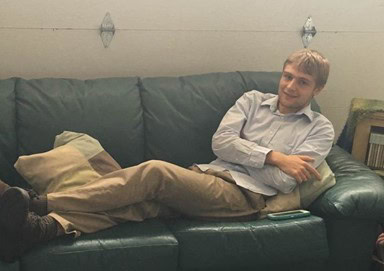 Parties, however, were the one popular college events that I couldn’t get into. No fault to my friends but coming exclusively down to their level was problematic. The blaring music overwhelmed my senses, not understanding anyone and feeling alienated. Had I been given a moment to observe, I would’ve understood that you don’t have to talk to socialize, and sometimes being in the moment is enough. Wearing headphones could’ve remedied the noise of parties and allow for more engagement.
Parties, however, were the one popular college events that I couldn’t get into. No fault to my friends but coming exclusively down to their level was problematic. The blaring music overwhelmed my senses, not understanding anyone and feeling alienated. Had I been given a moment to observe, I would’ve understood that you don’t have to talk to socialize, and sometimes being in the moment is enough. Wearing headphones could’ve remedied the noise of parties and allow for more engagement.
A campus provides convenience in social life, one that I became so accustomed to that I didn’t consider the loss of such following graduation. I rarely asked for people’s phone numbers because if I wanted to talk to them, I’d meet them in the dorms. Communication is key to partake in group events, and I wish I could’ve actively pursued them. With more refined managing of my schedule, I could’ve been more socially active, but the anxiety of academics drained my energy, and my lack of attentiveness prevented me from pursuing solutions. My social life was consistent but not built for the long term.
The second half of college tested my social life and my mental health. My class schedule became less inclusive for running practice, as I’d have to maintain relationships in other ways, i.e. knowing their schedules, adjusting my own, and being more aware of events held at their houses. Pressure built from school as well to the point where I broke down, sobbing over the lack of free time. I overestimated myself as I signed up for an internship that, in retrospect, I should’ve resigned, as my effort was minimal and didn’t lead to any real opportunities. My parents suggested that I consider stepping down from running, but I knew that wouldn’t help matters, as I needed the exercise to relieve stress. Sacrificing several hours to workouts was far preferable than the aimlessness that I could feel. Outside factors, such as an appendicitis and my car breaking down (and being broken into) only added to the stress. How did I get through it? I sought any resources available: tutors, study rooms for student-athletes, and consulting with friends on how to manage. My study strategy could deliver satisfying results but felt more tumultuous than needed. I should’ve utilized school breaks more to adjust my approach and research ways to improve my work ethic.
Utilizing the library, my focus enhanced now being in a public setting, not performing any exuberant gestures that I partook in private (also known as stimming). Anxiety persisted as the setting could be overwhelming, but some physical activity would counter this, such as walking back and forth to the drinking fountain. Though more subtle movements (i.e., tapping my fingers across the table) proved to be more effective. Unbeknownst to me, I had another condition: ADHD. This was the cause of my struggles to focus and why I was so prone to anxiety. Being undiagnosed didn’t make it impossible, but it made everything that much harder.
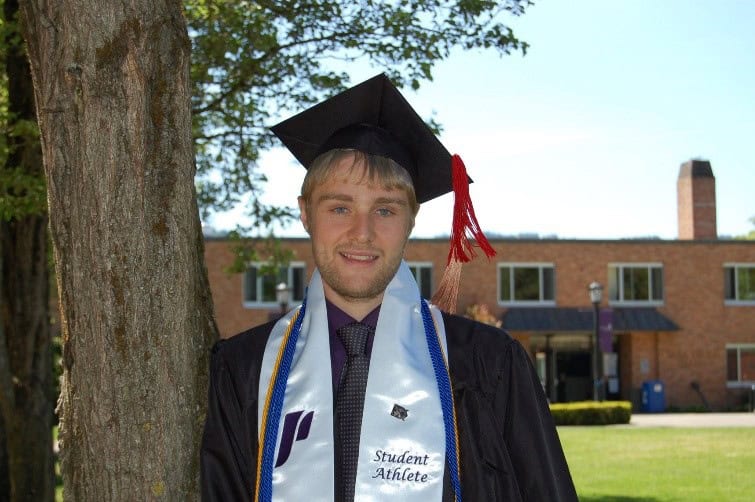 I earned my graduation degree. The time spent with tutors, professors, and study groups showed my determination. The fact I could accomplish it even without diagnosis of my ADHD shows it is doable, but it could’ve been alleviated. My professors’ approach demonstrated the challenges of teaching neuroatypicals and how to find the best teaching methods for them. Friendships were crucial: I needed assurance that I wasn’t alone in my academic struggles, and they provided periods of relief. There were many missed opportunities in college: I didn’t go on dates, my study strategy should’ve been altered, and my career planning was lackluster. My time at UP was still a positive one, gaining new insights of both the outer world and my personal life. It prepared me for new challenges ahead in life, but no one could predict what the next year would bring to the class of 2019 and how it would force me to advance beyond my known capabilities.
I earned my graduation degree. The time spent with tutors, professors, and study groups showed my determination. The fact I could accomplish it even without diagnosis of my ADHD shows it is doable, but it could’ve been alleviated. My professors’ approach demonstrated the challenges of teaching neuroatypicals and how to find the best teaching methods for them. Friendships were crucial: I needed assurance that I wasn’t alone in my academic struggles, and they provided periods of relief. There were many missed opportunities in college: I didn’t go on dates, my study strategy should’ve been altered, and my career planning was lackluster. My time at UP was still a positive one, gaining new insights of both the outer world and my personal life. It prepared me for new challenges ahead in life, but no one could predict what the next year would bring to the class of 2019 and how it would force me to advance beyond my known capabilities.
Part 1 – Early Years of Aspergers – https://www.tillamookcountypioneer.net/the-view-from-here-the-early-years-of-aspergers-syndrome/
Part 2 – Autistic Adolescence https://www.tillamookcountypioneer.net/the-view-from-here-autistic-adolescence-part-2-of-series/

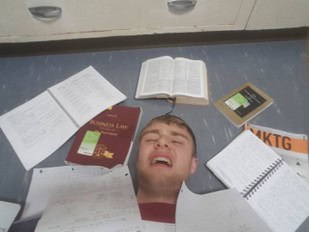
.png)